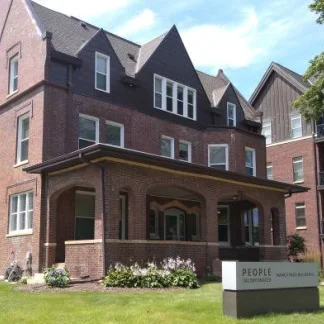Overcoming Addictions
Overcoming Addictions provides the best practices; evidence-based comprehensive ...
People – Nancy Page Crisis Residence is a 24 hour supervised rehab center for substance abusers in a crisis located in Minneapolis, MN. This rehab center helps those with drug and alcohol addiction alongside individuals with co-occurring mental health disorders. The crisis team at this addiction treatment center includes nurses, clinical social workers, therapists, psychiatrists, and certified peer specialists.
At People – Nancy Page Crisis Residence, professionals help individuals address their immediate mental health needs while creating a client centered crisis prevention plan to promote recovery. You can learn more about the crisis stabilization program below:
The People – Nancy Page Crisis Residence offers a crisis stabilization program in an inpatient setting. This rehab program helps those with drugs and alcohol find stable ground when seeking active recovery treatments.
Some of the things included with this program are individual and group rehabilitative skill building sessions and assessments of immediate needs to provide stability.
In addition, this stabilization treatment option also provides 24 hour onsite staff assistance, medication management, substance abuse education, and individualized treatment planning.
Contact us for more information: (612) 870-3787

Connect with People - Nancy Page Crisis Residence by calling their admissions team directly.
(612) 870-3787 Website Get DirectionsCognitive Behavioral Therapy (CBT) is a therapy modality that focuses on the relationship between one's thoughts, feelings, and behaviors. It is used to establish and allow for healthy responses to thoughts and feelings (instead of unhealthy responses, like using drugs or alcohol). CBT has been proven effective for recovering addicts of all kinds, and is used to strengthen a patient's own self-awareness and ability to self-regulate. CBT allows individuals to monitor their own emotional state, become more adept at communicating with others, and manage stress without needing to engage in substance abuse.
Group therapy is any therapeutic work that happens in a group (not one-on-one). There are a number of different group therapy modalities, including support groups, experiential therapy, psycho-education, and more. Group therapy involves treatment as well as processing interaction between group members.
In individual therapy, a patient meets one-on-one with a trained psychologist or counselor. Therapy is a pivotal part of effective substance abuse treatment, as it often covers root causes of addiction, including challenges faced by the patient in their social, family, and work/school life.
Trauma therapy addresses traumatic incidents from a client's past that are likely affecting their present-day experience. Trauma is often one of the primary triggers and potential causes of addiction, and can stem from child sexual abuse, domestic violence, having a parent with a mental illness, losing one or both parents at a young age, teenage or adult sexual assault, or any number of other factors. The purpose of trauma therapy is to allow a patient to process trauma and move through and past it, with the help of trained and compassionate mental health professionals.
Group therapy is any therapeutic work that happens in a group (not one-on-one). There are a number of different group therapy modalities, including support groups, experiential therapy, psycho-education, and more. Group therapy involves treatment as well as processing interaction between group members.
In individual therapy, a patient meets one-on-one with a trained psychologist or counselor. Therapy is a pivotal part of effective substance abuse treatment, as it often covers root causes of addiction, including challenges faced by the patient in their social, family, and work/school life.
Trauma therapy addresses traumatic incidents from a client's past that are likely affecting their present-day experience. Trauma is often one of the primary triggers and potential causes of addiction, and can stem from child sexual abuse, domestic violence, having a parent with a mental illness, losing one or both parents at a young age, teenage or adult sexual assault, or any number of other factors. The purpose of trauma therapy is to allow a patient to process trauma and move through and past it, with the help of trained and compassionate mental health professionals.
In individual therapy, a patient meets one-on-one with a trained psychologist or counselor. Therapy is a pivotal part of effective substance abuse treatment, as it often covers root causes of addiction, including challenges faced by the patient in their social, family, and work/school life.
Trauma therapy addresses traumatic incidents from a client's past that are likely affecting their present-day experience. Trauma is often one of the primary triggers and potential causes of addiction, and can stem from child sexual abuse, domestic violence, having a parent with a mental illness, losing one or both parents at a young age, teenage or adult sexual assault, or any number of other factors. The purpose of trauma therapy is to allow a patient to process trauma and move through and past it, with the help of trained and compassionate mental health professionals.
Trauma therapy addresses traumatic incidents from a client's past that are likely affecting their present-day experience. Trauma is often one of the primary triggers and potential causes of addiction, and can stem from child sexual abuse, domestic violence, having a parent with a mental illness, losing one or both parents at a young age, teenage or adult sexual assault, or any number of other factors. The purpose of trauma therapy is to allow a patient to process trauma and move through and past it, with the help of trained and compassionate mental health professionals.
Overcoming Addictions provides the best practices; evidence-based comprehensive ...
Headway Emotional Health Services – Nicollet Avenue South is a private rehab loc...
Al Anon is a private rehab located in Saint Louis Park, Minnesota. Al Anon speci...
Specializing in opioid addiction, dual diagnosis, alcoholism, mental health, sub...